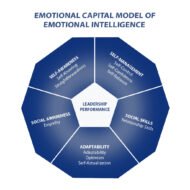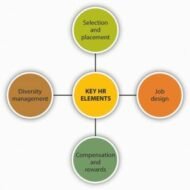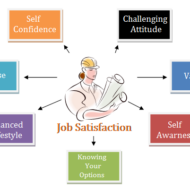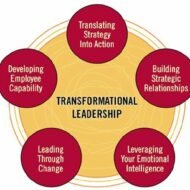Posted by Managementguru in Business Management, Decision Making, Entrepreneurship, Human Resource, Organisational behaviour, Principles of Management
on Mar 20th, 2014 | 0 comments

Emotional Intelligence for Effective Inter Personal Relationships What is Emotional Intelligence : an ability or capacity to perceive, assess, and manage the emotions of one’s self, and of others. Role of Emotions: Emotions play a critical role in organizations where there is a need for people to work in groups or teams. A leader who is strong in mind and thoughtful can perceive, observe and direct the emotions of the team members through proper channels. Such a leader is said to be “emotionally intelligent”. No! It is not about intelligence quotient but emotional intelligence. Empathy is the ultimate quality expected in leaders and managers rather than being rated high in the IQ scale.The capacity to perceive, scrutinize and manage one’s own emotions and that of others is one major factor of advantage in the concept of emotional intelligence. An emotionally intelligent person can institutionalize and manage change as well as make powerful decisions. Grooming of Human Mind and Skills: Human resource management throws up a real challenge to corporate organizations, where human minds and skills have to be groomed for the purpose of transcending their performance to remarkable levels in order to satisfy the production requirements. This is possible only when an organization has a leader who can draft and amalgamate the process of relationship management and skill development without a glitch for the benefit of the organization . Transformational leadership with constructive attitude and open approach is well appreciated and accepted by the worker force. What are the distinct features of emotional intelligence? High perception Being insightful Sensitive to the needs and requirements of the employees Self-control Self-awareness Open communication Empathy Change management skills Effective decision making Ever sanguine Instrumental in developing interpersonal skills Breaks the conventional rules Aggressive and daring in his approach Socially popular and easily gain acceptance Motivation driver The rational quotient behind emotional intelligence helps people to think and act smart even during nerve-racking situations.Emotional intelligence helps people to think and act in a logical manner in stressful situations that can divert their energy into positive thinking. A leader with high emotional intelligence can work efficiently with his team members. The spirit of exuberance from the leader acts as a positive signal and takes the pressure off the employees’ mind. It is this ability to identify and understand the emotions of people working under him makes him a comrade rather than a commando. Why EI is Necessary? Emotional intelligence is necessary for top level executives at management level to stand out and succeed. An ordinary employee who does mundane job everyday is expected to be technically sound and well-trained. The same criterion can never be applied to a manager or a chief executive who is bound to manage both formal and informal teams working under the same roof. Only persons who are emotionally sound can uphold the proceedings with dynamism and verve. By motivating human personnel you can get things done in a smooth manner: Give them a fresh start to prove themselves in case if they fail at the first attempt Anger management of self/others Channelize the emotions of self/others and create positive vibes Perceive the problems from various angles to get a complete picture Understanding the root of the problem Treating work as fun Thinking out of the box – parallel thinking and creative thinking must be encouraged amongst the employee group. People with high emotional intelligence are the ones needed in business community as big corporate organizations always find it difficult to manage human resource. The management has to devise a system that takes into account the intricacies of human mind and assigning right people to handle the perplexities....

Posted by Managementguru in Business Management, Human Resource, Organisational behaviour, Principles of Management, Training & Development
on Mar 20th, 2014 | 0 comments

Managing Critical Factors of HR The prerequisite for an organization to excel in all aspects of its business activities is absolute strategic management of its HR functions.Human resource management is an extensive term that covers various aspects of personnel function. This discussion is focused on three main aspects that constitute human resource management. Personnel administration Human resource development Industrial relations Personnel administration: It can be also called as the HR module where policies and programmes are laid down by the HR department for the benefit of the human resource personnel. Employment and compensation are chiefly dealt with in personnel administration. While business firms in the corporate environment are in constant demand of man power, finding the right person for the right job is always a testing task for them. Right from job analysis to HR planning, recruitment, selection, placement, induction and orientation, HR department is held accountable to define and develop these operative functions. Mere acquisition and incorporation of human resource is not adequate, the organizations have to engage themselves in empowering their employees through competent training, motivation and refining their social relations. Job Assessment: Job assessment has to be done for fixing compensation that includes wages and salary administration, incentives, bonus, fringe benefits and social security measures. The shifting business environment and consumer requirements compel the organizations to restructure and re-engineer their organizational functions. These moves can be viewed as strategic responses reflecting from all domains of an organization, namely product, marketing, manufacturing etc., where people are the centre of focus. Human resource development: This is easier said than done. Firms are trying to evolve and employ various methodologies of training to enhance the performance levels to the desired standards. Performance cannot be achieved by coercion or bureaucracy, as the work force is protected by numerous enactment of labor laws enforced by various governments. Training and development is a separate entity by itself and is a continuous process that aims at the development of the organization as a whole and also facilitates employee career planning and development. Industrial relations: The following factors have to be scrutinized by the management to maintain good personal relations with the employees. Motivation Morale Job satisfaction Communication Grievance handling Discipline procedure Quality of work life Employee participation All said and done, the organizational health can be measured by checking the effectiveness of HR management through aspects like HR audit and research that aid the firms to analyze and understand the extent to which they are efficient in utilizing human resource for the benefit of their organization. The experience of a human resource manager comes in handy at situations like these, where he has to don different roles to suit the occasion. Personnel role-advisor for top management, policy maker, counselor to employees, spokesman of the company, change analyst, liaison Welfare role-researcher, catering man, motivator Clerical role-time keeping, wages and salary administration, record maintenance, human engineering Fire fighting legal role-negotiator, trouble shooter, peace maker, problem solver, grievance handling. The management employs scientific, analytical, psychological and social techniques to build the business around human resource, who are the real value additions to the...

Posted by Managementguru in Decision Making, Entrepreneurship, Human Resource, Principles of Management
on Mar 20th, 2014 | 0 comments

How Women Entrepreneurs are Viewed by the Society An entrepreneur is one person who has the ability to think out of the box, to cash in on the opportunities, to think big and different, to go for innovative ideas, to take warranted risks and to make a difference amongst the ordinary lot. Modern business world and the society as a whole have understood the importance of women emerging as successful and powerful entrepreneurs which has proven good for the growth of a country’s economy. Challenges of being a woman: The challenges start at the grass root level: being a woman is sufficient enough to create a gender bias and to be looked down. Physically the differences are obvious and the strength that a man is empowered with cannot be overruled, but the inner strength and the power to conquer that a woman is empowered with can never be equaled. Running a household is even more difficult than running a corporate business. All your management principles come under the household umbrella. No tactics or strategy is left unturned for the smooth running of the household. A woman needs no training in areas of strategic planning decision making(comes naturally) developing interpersonal relationship delegating authority decentralization managing leadership motivating others and self motivation crisis management impression management quality of work Women CEO’s add Value to their Companies: Nature has blessed her with all these and many more managerial qualities that are needed to manage an organization effectively and efficiently. Gone are the days when they were treated a step down, now most of the corporates have very efficient women CEO’s and their ability is reflected in terms of productivity and profitability. Moreover a woman adds value to the company as responsibility is her second name and this works out in favor of the organization to gain the trust and confidence of its consumers, suppliers and stake holders. A woman can occupy any post of its highest kind including the presidential or prime ministerial positions. The enthusiasm that a woman entrepreneur exuberates is infectious and induces positive vibes in the organization. Be it negotiations, tackling the union leaders and workers, business travels or bargaining, nothing is a problem. She is more efficient in clinching deals and proves adventurous in concluding new business ventures. Work – Life Balance: A woman has to have a balance between her family, relationships, children and work. That is the biggest ever challenge which she handles with ease. The financial pinch that the recent economy has created has served as an eye opener for men in realizing the fact that a house needs two financial paymasters for running the show. Success Ratio of Women Entrepreneurs: Many few women entrepreneurs emerge out as victors as most of them lack support from their counterparts and lack of financial support from banks, financial institutions may also slacken the pace and hinder their progress. The success ratio has considerably increased when compared to olden days but still many of them lack the nerve to start their own business. Ignorance and lack of self reliance are the major factors hindering the development of female entrepreneurs. I have seen many women who are born in business families with natural business instinct and their added advantage would be the already available infrastructure, platform and guidance to grow and make it to the top. Even circumstances force certain women to go in for self owned business and once they taste the essence of success they never want to look back. The society has a bigger role to play in developing more women entrepreneurs by giving positive support. Women have a better judgement on role analysis and perception which turn them into better role models in any field or...

Posted by Managementguru in Decision Making, Human Resource, Motivation, Organisational behaviour, Principles of Management
on Mar 19th, 2014 | 0 comments

Are You Happy with Your Job What is your attitude towards Job? How many of us go to work with cheery attitude and positive framework of mind. Most of us treat work as a duty or accountability. Either way it does not solve the purpose. If you treat job as a duty, there can never be any enjoyment attached to it. In case of accountability, you work to reach some targets without any passion for the job or you spend most of your time dreading the thought of reporting to your superior. Without involvement and love, any job is not complete and people experience only “Job Satis-friction“and not satisfaction. Have you thought about it? Scenario in Developing Countries: In most of the developing countries the proportion of dissatisfied group dominates the satisfied set of employees. This is because preference and priority is to earn the daily bread rather than achieving anything big. Well, this attitude shall be attributed to the low income group where without work their lives cannot go on. But the bottom line remains the same, the work should be satisfying. So, what are the terms? Also See: Performance Appraisal High Income Group: In high income group and higher level jobs where the work is very challenging, we see that the employees are very much satisfied with their work. They need constant battles to win over and are provided with such an environment that puts their think tanks into full use. But is it enough to keep them satisfied; no, the reward system has to be equally compensatory. Rewards in terms of pay, perks, recognition, appreciation, social status, awards and what not. So, how do we correlate satisfaction factor with productivity? The organization has to maximize the positive relationship between performance and reward systems. Also See: How to Handle Attrition 30 Simple Ways to Make Your Employees Happier Repetitive and Monotonous Jobs: Repetitive and monotonous jobs make a person dull headed and a stereotype; his enthusiasm is absorbed to the extent that he fails to understand and rejuvenate his skills. The job content should provide at least some sort of cheer and interest to the performing individual. Say for instance, you manufacture plain paper cups, if you decide to incorporate some floral designs on the covers; you very well witness a fresh whiff of enthusiasm amongst your work force. Such is the power of variety and change that brings cheer into human lives and attitude. If you are a terrific boss everybody will like you but if you are a source of terror, chances are there that there is a high turnover ratio in your company. People after all expect certain level of consideration and warmth from their bosses. Organizations must make the individuals perceive their roles properly to affirm satisfaction and to avoid conflicts. Career Advancement: Courtesy – Roscostretch Career advancement is what most of the people aspire and when they don’t find any scope for advancement their interest in the job gradually decreases. Merit versus experience factor also has its say over deciding the next probable candidate for promotion. The top level management, especially the human resource department must ensure the employees with a supportive environment that paves the road for collaborative effort and in turn internal satisfaction. Job Satisfaction: Job satisfaction has to be considered from a broader perspective that encompasses all the independent and dependent variables that affect the nature of a particular job. This is very vital to an organization as job dissatisfaction leads to absenteeism, high turn over or attrition and decline in productivity. A dissatisfied employee is always a pain who can create problems by voicing his protest, gathering the union, neglecting his work or quitting. To avoid friction in the minds of...

Posted by Managementguru in Change management, Decision Making, Entrepreneurship, Human Resource, Leadership, Principles of Management
on Mar 19th, 2014 | 0 comments

Transformational Leadership What is Transformational Leadership: a leadership approach that causes change in individuals and social systems. Humans generally prefer to have a serene life without much hitches or hurdles in the way. Even if they are to witness a problem situation, they tend to pull themselves away from the scene of action to avoid consequences that may lead to complications at a later date. Very few are bestowed with qualities that make them appear exceptional to the eyes of ordinary men and women. Such people bring wonderful transformations in the lives of people, who willingly follow the leader and support the cause. Need for Transformational Leaders: In business environment, there has always been this debate, whether transformational leaders show success! But it has to be kept in mind that each component of transformational leadership has relevance for improving the decision-making process. In comparison, individually considerate leaders make sure that all parties to the problem are heard. Intellectually stimulating leaders reformulate with followers, colleagues, or superiors into more familiar and concrete terms, what may have begun as fuzzy. Inspirational leaders increase confidence and raise aspiration levels, that the problem can be solved once its causes have been determined. Decision-Making Styles: Leaders with idealized influence show their concern about the problem and the need for its solution. The common thread that emerges from the discussion on decision-making is that decision making styles may be primarily viewed as being based on logic or feeling and instincts. The rational and intuitive decision-making styles are generally considered in conjunction since they represent two ends of a continuum as observed through most studies. While making decisions, transformational leaders are more likely to Be proactive to incipient problems, anticipating the emergence of problems more frequently and farther in advance. Incremental, taking small steps toward problem solving without waiting for a guarantee of complete success. Willing to look at a problem in a larger context and longer time frame. Encouraging of search and choice that take into account the wider context of the larger organization and outside environment rather than limiting the search to the immediate neighborhood of the problem. Quick to react to emergent problems. Seeking information informally for making their decisions rather than prescribed by organizational rules. Practicing walk-around management to promote the upward flow of communication and information. Making decisions involving higher payoffs at higher risks rather than decisions that favor exploitation and achieve lower payoffs at lower risks. Willing to take failure in their stride. Rationale in Making Decisions: The rational style of making decisions is deliberate, analytical, and logical assessing the long-term effects of decisions and having a strong fact-based orientation. The intuitive style is feeling-oriented and based on internal ordering of information. Such decisions are made quickly. The dependent style is characterized by use of support from others while delay and denial characterize the avoidance style. The spontaneous style displays a strong sense of immediacy and an interest in getting through the decision-making process as quickly as possible. A transformational leader would more likely to make decisions rationally after considering carefully all the facts and information and spending a considerable time over the decision-making process. Transformational leadership will be positively related to rational, spontaneous and dependent decision-making styles, and will be negatively related to intuitive and avoidance decision making. The interaction effect of rational and dependent decision making styles on transformational leadership will be...










